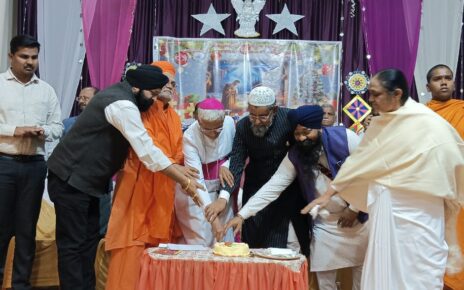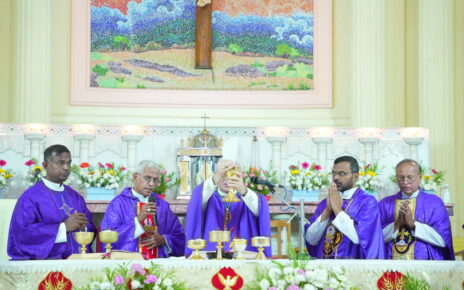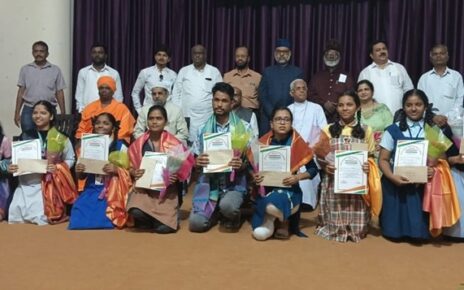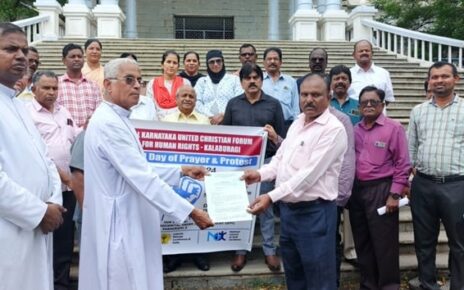COMMISSION FOR ECUMENISM
Secretary: Fr Wilson Fernandes Bidar
Joint Secretary: Fr Chinnapan CPPS Basavakalyan.
Core Group: Fr Deepak furtado Surpur, Fr Vinod Paul S.J Vijayapura, Fr James Paul SDB Chikpet Bidar, Fr Santhosh Dias Gulbarga, Sr Ida Lobo SSpS Ekamba, Dr Kiran George Gulbarga, Mr Sudhakar Bidar.
Introduction
The search for Christian Unity was one of the principal concerns of the Second Vatican Council. From this Council onwards fraternal relations with churches and ecclesial communities not in full communion with the Catholic Church have intensified; theological dialogues set up and increased in number.
Pope Francis in his Apostolic Exhortation Evangelii Gaudium (E.G), the Joy of the Gospel says: “Commitment to Ecumenism responds to the prayer of Lord Jesus that “they may all be one” (John 17:21). The credibility of the Christian message would be much greater if Christians could overcome their divisions and the Church could realize the “fullness of Catholicity proper to her in those of her children who, though joined to her by baptism, are yet separated from full communion with her” (Unitatis Redintegratio The Restoration of Unity–4). The immense numbers of people who have not received the Gospel of Jesus Christ cannot leave us indifferent.
Consequently, commitment to a unity which helps them to accept Jesus Christ can no longer be a matter of mere diplomacy or forced compliance, but rather an indispensable path to evangelization. Signs of division between Christians in countries ravaged by violence add further causes of conflict on the path of those who should instead be a leaven of peace. How many important things unite us! If we really believe in the abundantly free working of the Holy Spirit, we can learn so much from one another! It is not just about being better informed about others, but rather about reaping what the Spirit has sown in them, which is also meant to be a gift for us.” (EG. 246) “Respectful understanding of their doctrines, history, their spiritual and liturgical life, religious psychology and cultural background, ecumenical dialogue between the Churches, co-operation in social matters, sharing of means to relieve the afflictions such as famine and natural disasters, illiteracy and poverty and lack of housing, are different ways of practice of ecumenism” ((UR.9-12)
On October 31,2016, the “500th” year of the Lutheran Reformation – Pope Francis and the heads of the Lutheran World Federation embraced each other at the Lund Cathedral, Sweden, signaling the end on animosity and suspicion and as a major step to “full communion” and brought out a “common document” – “From Conflict to Communion: Lutheran – Catholic Common Commemoration of the Reformation in 2017”, signed by both Pope Francis and Bishop Mounib Younan, President of the Lutheran World Federation pledging to continue dialogue to remove obstacles. Likewise dialogues with the Eastern & other Orthodox Churches have taken a positive shape/construct through (Pontifical Council for the promotion of Christian Unity PCPCU).
VISION: Churches united witness Christ
MISSION: Collaboration among Christians for building Christian unity.
GOAL: All Churches/Denominations, Independent Evangelicals are of one mind in faith and action.
OBJECTIVES
Objective 1: There is solidarity among all Christian denominations by 2024.
Indicators
- All Christian leaders and faithful participate in ecumenical gatherings with much enthusiasm.
- In the time of emergencies and common concerns, all Christians collaborate.
- Increase in the number of common celebrations.
- Attitude of sharing facilities among Christians.
- Respect for each other among faithful of different churches and denominations.
Strategies
- KUCFHR is initiated at taluka & district levels
- Building rapport with the Heads of all denominations at different levels.
- Regular meetings of different churches / denominations, independent evangelicals at different levels.
- Common programmes of Christmas, unity Octave, Lent, Easter Celebrations, and Retreats are organised.
- Political and social concerns are addressed by the(KUCF) Forum and continued efforts are made to represent grievances and problems to the civil authorities as one community.
Activities:
There is solidarity among all Christian denominations by 2024.
- Contacts are established with pastors at Zonal/taluka levels, proper data & statistics are collected.
- Common Ecumenical Christmas Celebration is organized.
- Ecumenical Unity Prayer week is observed in January 2022.
- With regular meetings, KUCFHR is shared at taluka levels by March 2022.
- Concerns are addressed by all Christians as and when the need arises.
- COMMISSION FOR INTER-RELIGIOUS DIALOGUE
Secretary: Fr Wilson Fernandes Bidar
Joint Secretary: Fr Chinnapan CPPS Basavakalyan.
Core Group: Fr Deepak furtado Surpur, Fr Vinod Paul S.J Vijayapura, Fr James Paul SDB Chikpet Bidar, Fr Santhosh Dias Gulbarga, Sr Ida Lobo SSpS Ekamba, Dr Kiran George Gulbarga, Mr Sudhakar Bidar.
Introduction
Inter-religious dialogue is a challenging process by which adherents of differing religious traditions encounter each other in order to break down the walls of division and misunderstanding that stand at the centre of many of the conflicts. The objective of Inter Religious Dialogue is understanding, harmony and peace. IRD Commission has tasked itself with the responsibilities in below mentioned areas, based on the Vatican II declaration – “Nostra Aetate”
- To promote mutual understanding, respect and collaboration between Catholics and followers of other religious traditions.
- To encourage the study of religions
- To promote the formation of persons dedicated to dialogue
Pope Francis speaking about the Inter Religious Dialogue in his Apostolic Exhortation (E G –Evangelii Gaudium – The Joy of the Gospel) says: “An attitude of openness in truth and in love must characterise the dialogue with the followers of non-Christian Religions, in spite of various obstacles and difficulties, especially forms of fundamentalism on both sides.” Inter Religious Dialogue is a necessary condition for peace in the world, and so it is the duty of Christians, as well as other religious communities. This dialogue is in the first place a conversation about human existence or simply, as Bishops of India have put it, a matter of “being open to them, sharing their joys and sorrows” (Indian Bishops Conference, Final Declaration of the XXX Assembly: The Role of the Church for a Better India (8th March, 2013 nos. 8-9). In this way we learn to accept others and their different ways of living, thinking and speaking. The church invites each of us to involve ourselves in any type of dialogue namely: dialogue of life, dialogues of theological reflection, dialogue of action and dialogue of religious experience.
True openness involves remaining steadfast on one’s deepest convictions, clear and joyful in one’s own identity, while at the same time being “open to understanding those of the other party” and “knowing that dialogue can enrich each side” (RM 304). What is not helpful is a diplomatic openness which says “yes” to everything in order to avoid problems, for this would be a way of deceiving others and denying them the good which we have been given to share generously with others. Evangelization and Inter religious dialogue, far beyond being opposed, mutually support and nourish one another (EG 251).
“The Church, therefore, urges her sons and daughters to enter with prudence and charity into discussion and collaboration with members of other religions. Let Christians, while witnessing to their own faith and way of life acknowledge, preserve and encourage the spiritual and moral truths found among non-Christians, also their social life and culture.” (Nostra Aetate – In the Age of Ours, #2)
Finally, since peace is the goal of interreligious dialogue, the process must be peaceful. It is important to realize that peace is not easily achieved and maintained. Peace does not occur in a day and there are obstacles as intrepid travellers struggle up the path to heights where the human spirit may soar (viz., Basic Human Communities) in unity of spirit amongst diversity.
VISION: People of different Faiths live in harmony & solidarity.
MISSION: Encourage people of all religions to foster respect and support each other.
GOAL: People of different faiths peacefully co-exist respecting and supporting each other
OBJECTIVES
Objective 1: By 2024, there is basic understanding of each other’s faith.
Indicators:
- Respect for each other’s religious beliefs
- Increased participation in festivals of other religions
Objective 2: We (Church) join the likeminded groups when common problems arise, and conflicts of the people are addressed by 2024.
Indicators
- People come together to show mutual concern towards each other.
- People of all religions participate in large numbers in protest marches / rallies
- A structure (Inter-religious Forum for Peace & Harmony) created to plan and implement programmes for common action
- Increased team building and unity among all.
- NGOs/FBOs are involved in Peace initiatives.
- Peace & Harmony clubs are established in educational institutions.
- SatSangh (Faith sharing) is promoted
Strategies
- Regular meetings at all levels are organized to report, review and revise plan.
- Regular training programmes are conducted for the facilitators at all levels.
- Building rapport with the Heads of all religions at different levels.
- Thinkers of different religions brought together for exchange of religious teachings and values.
- Continued efforts to represent to the authorities by heads of religions collectively.
Activities:
Objective 1: There is basic understanding of each other’s faith by 2024
- Celebrating Christmas and Gudi Habbas with people of other religions,
- Schools will have programmes on inter-religious harmony inviting other religious heads/leaders.
- Inter-religious Christmas is celebrated at taluka levels.
- Attending other religious festivals by local priests and religious.
- Festivals of other religions are celebrated in our educational institutions.
- Inter-Religious Forum for Peace & Harmony is formed at deanery level.
Objective 2
We (Church) join the likeminded groups when common problems and conflicts of the people are addressed by 2024. (As & when issues arise….)










